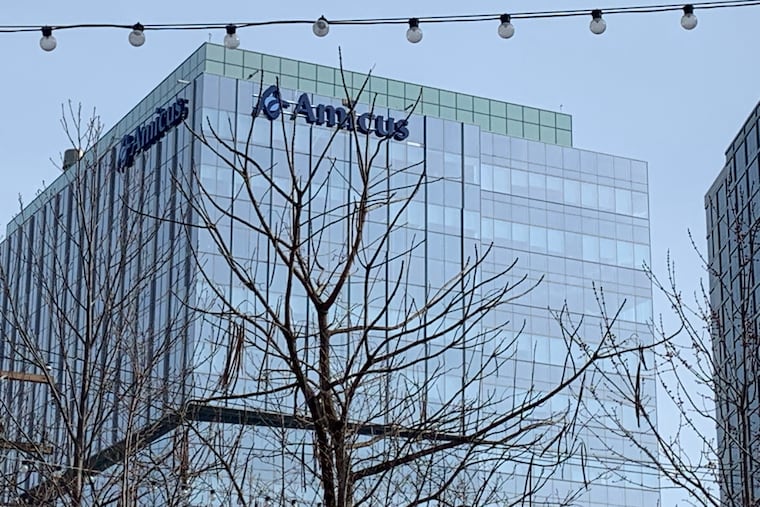Amicus opens UCity R&D tower, calls Philly the ‘Cradle of Cures’
A Princeton-area biotech company has moved its R&D to Philadelphia, where it will employ 200, because, its founder says, this is where the genetic scientists are. Plus, Boston is full

Amicus Therapeutics, a publicly traded biopharmaceutical firm focused on rare diseases, has moved nearly 100 R&D professionals over the last year into 3675 Market St., in Philadelphia’s University City, and plans to add another 100.
“Here in Philadelphia is where we are going to do all our science,” says John Crowley, chief executive of Amicus, which is based in Cranbury Township, near Princeton and calls its new West Philly labs the Global Research & Gene Therapy Center of Excellence.
Crowley also calls Philadelphia “the Cradle of Cures,” a label that might possibly stick better than “Cellicon Valley” and the other titles that the city’s bio boosters have pushed in recent years.
Amicus’ abstract logo, Crowley says, recalls both the Liberty Bell, and a DNA double helix. “We’ve been hiring pretty aggressively,” he added.
He held open house last week after pasting his sign atop what’s now the Amicus building. “Philadelphia is a magnet for gene technology and gene therapy,” Crowley told me afterward. “You have great, great talent. The gene therapy center at Penn, with Dr. Jim Wilson, is the world’s leading research center. They are our partners," and are just a few blocks apart across the Penn campus.
Crowley, a Georgetown-Harvard Business-Notre Dame Law grad and retired Navy officer, got into biotech the hard way: Two of his kids were born with Pompe’s disease, leading to muscular dystrophy and threatening early death.
In 1998, he joined Bristol-Meyers to work on cures, moved on with William Canfield to found Novazyme to bring his Pompe’s treatment to market, and sold the business for $138 million to Genzyme (which enrolled his son and daughter for the treatment) in 2001.
The actor Harrison Ford turned Crowley’s family saga into a movie — Extraordinary Measures — based on Geeta Anand’s book The Cure, with Ford playing a Canfield-like composite doctor and Crowley played by the actor Brendan Fraser. New Jersey Republicans considered running him for the U.S. Senate.
His current company Amicus — it employs 600, in all — has taken the top three floors at 3675 because “the future of research and development, in rare diseases and beyond, is Philadelphia,” Crowley told me Thursday.
“Most of our team relocated to the area. We have relocated people from California and Boston to work here at Amicus.” They have moved to the Main Line, to South Jersey, and “a lot of our younger employees are living in the city. It’s neat how it’s grown.”
Amicus, founded in 2007, is worth $3 billion on the stock market. Its lead product is Galafold, used every other day by 1,200 U.S. and European patients with Fabry disease, a rare, genetic, painful condition whose patients lack a key enzyme.
That treatment costs insurers $200,000 a year; Crowley says there are payment plans for those who need help. Company sales total about $250 million a year; expenses are more than $400 million, leaving Amicus to rely, for now, on investors and research grants to fund its losses. “We have $450 million in cash, so we are well-funded for a number of years” while other projects move to market, Crowley concluded.
The Philly biotech scene, Crowley says, "reminds me of Kendall Square in Boston 15 years ago. So much was happening then. Now it’s so built up you can’t find space up there. "
He noted that Rhode Island Gov. Gina Marie Raimondo visited Philadelphia last summer, stopping by Amicus’ location as developer Wexford Science + Technology was fitting out the new space, to see whether she could get ideas for developing Providence (home to Brown University’s medical school, among other programs) as a med-tech center to pick up Boston’s overflow.